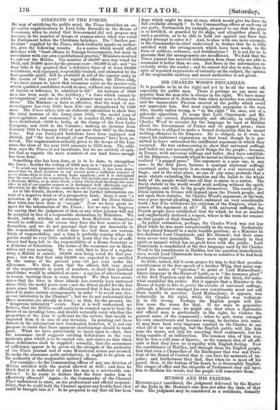SLR CHARLES WOOD'S PECCADILLO.
IT is possible to be in the right and yet to be all the worse off, especially for public men. There is perhaps no one more un- popular than the man who is always in the right. We have many classic instances of it, from the time when Aristides was ostracized, and the immaculate Phocion sneered at the public which could not appreciate him. But most especially unpopular is the man -who, mostly rather wrong, is "in the right" for once, out of a splenetic opposition. It seems that Lord Clanricarde and Mr. Disraeli are correct, diplomatically and officially, in calling Sir Charles Wood to account for the language he used at Halifax about the Government of France and its gagged press ; since Sir Charles is obliged to make a formal declaration that he meant nothing offensive to the Emperor. He is obliged, as it were, to cancel his indiscreet expressions on that head, though he is per- mitted to leave untouched the indifferent argument in which they occurred. He was endeavouring to show that universal suffiage and ballot are not necessarily good things for the people ; because, in France, with universal suffrage and ballot, they have establish- ed the Emperor,—towards whom he meant no disrespect,—and have realized "a gagged press." The argument is a poor one, in any case; in the first place' because a nominal universal suffrage exercised under bayonets is no example of a real universal suf- frage ; and in the next place' no one of any sense pretends that a mere statute extending the franchise and the ballot to the whole body of the people would cure all that is amiss in a nation. The finest statute in the world would work nothing without the spirit, intelligence, and will, in the people themselves. The result of po- litical opinion in France will depend upon the French people, and not upon their statutes. Sir Charles Wood's argument, at the best, was a poor special-pleading, which embraced no very considerable truth ; but if he withdraws his criticism of the Emperor, what be- comes of his argument at all ? If, with universal :mirage, the French people have established that for which he has so marked and emphatically declared a respect, where is the room for censure on that people or their franchise ?
In public estimation, perhaps, Sir Charles Wood was not less liked while he was more unequivocally in the wrong. Technically he has placed himself in a more tenable position ; as a Minister he has disarmed Lord Clanricarde and Mr. Disraeli ; but their arms were never very formidable. They were right precisely in that spirit or manner which has no great force with the public. Lord Clanricarde is scandalized at the free language used by Sir Charles Wood to his constituents in Halifax, but the question immediately rises, would Lord Clanricarde have been so sensitive if he had been Postmaster-General ?
So little, indeed, did it seem proper for him to feel that peculiar sensitiveness at the free speech of a brother Whig, that many sup- posed his notice of " question " to point at Lord Malmesbm7; whose language in the House of Lords as to "the immense glory" of the first Napoleon and the authenticity of the third, did some- what scandalize the public. But it appears that a Minister in the House of Lords is free to praise the results of universal suffrage although a Minister amongst his own constituents must not call these results in question. Lord Malmesbury, it appears, was technically in the right, while Sir Charles was technical- ly in the wrong. Perhaps the English people will like him none the worse for that. If we were to generalize upon the present case, we might say, that when a diplomatic and official man is particularly in the right, he violates the general sense of the community ; when he gets warm amongst his own constituents and becomes wrong, he deviates into sense. It may have been very improper conduct in Sir Charles to say what all of us are saying, but the English public will like him none the worse, not only for asserting their sentiments, but for being capable of an indiscretion. The common idea of him was, that he was a cold man of figures ; as the common idea of all offi-
cials is that they have no sympathy with English feeling. Now the constituents of Halifax, and through them the English people, find that even a Chancellor of the Exchequer that was and Presi- dent of the Board of Control that is can have his moments of fin- pulse; and furthermore they find, that when he is most off his guard, then, at the bottom of his heart, he is thoroughly English. The usages of office and the etiquette of Parliament may call upon him to disclaim his words, but the people will remember them.


























 Previous page
Previous page